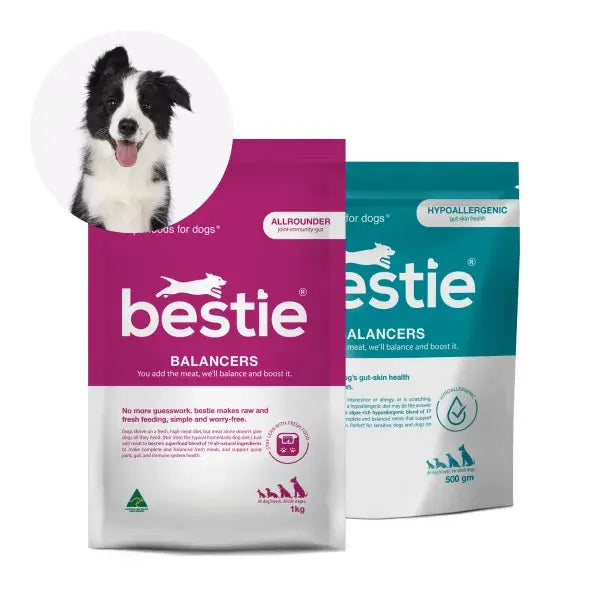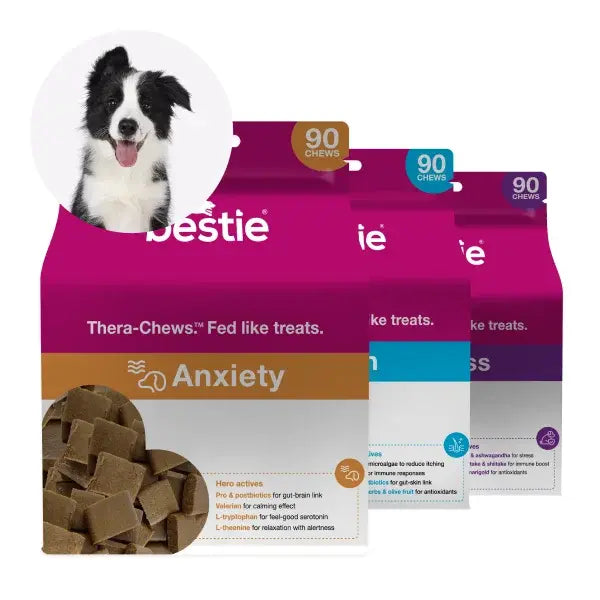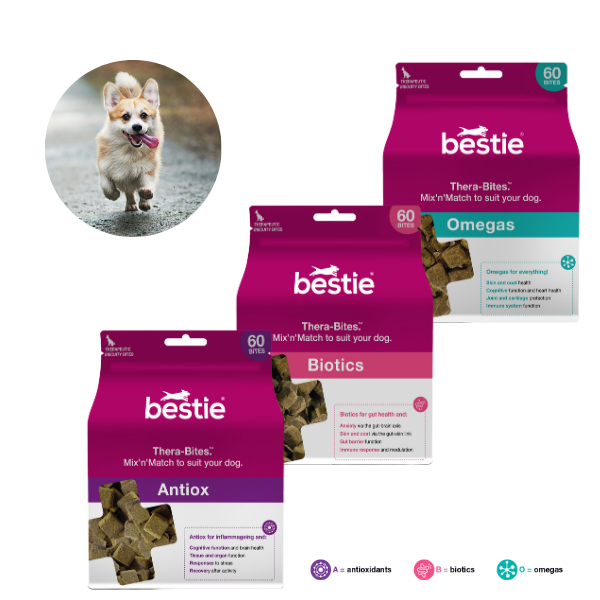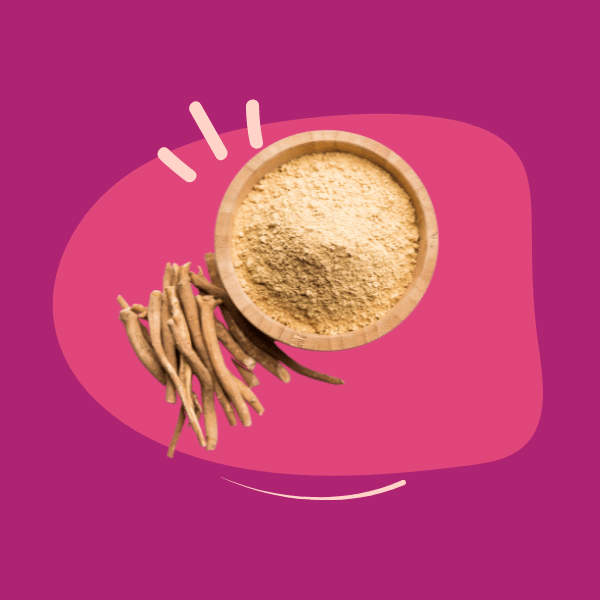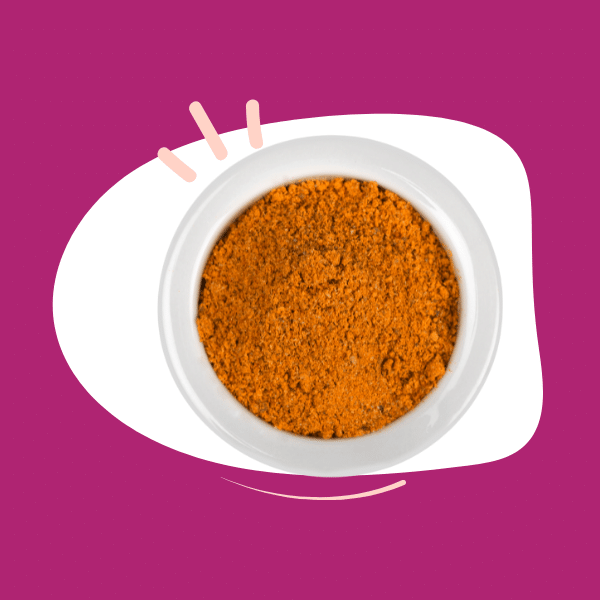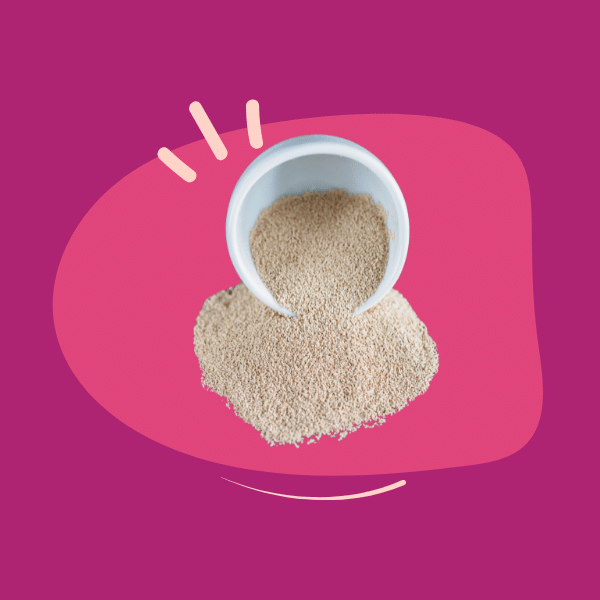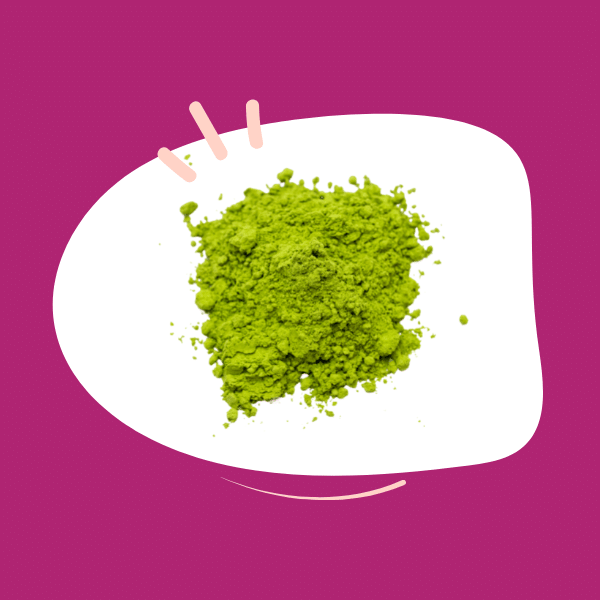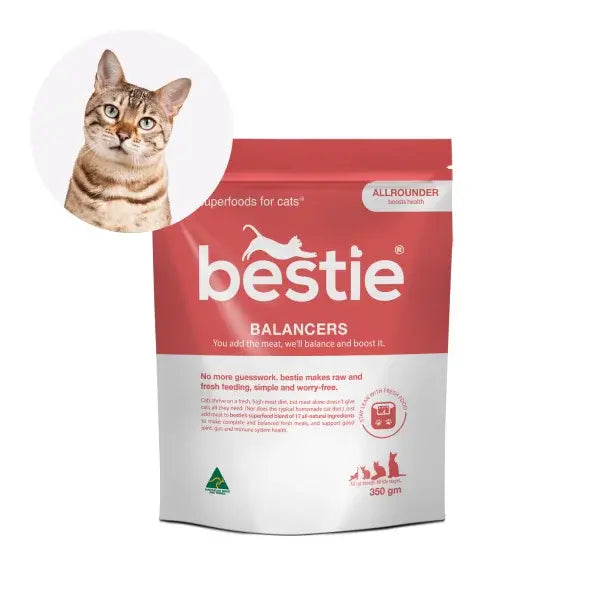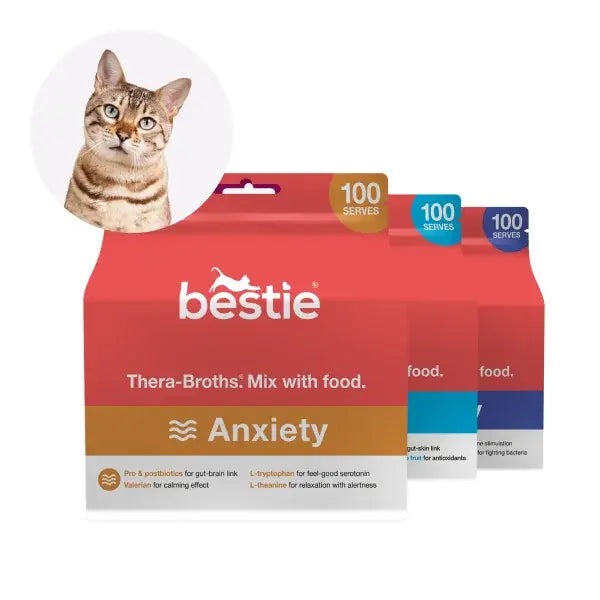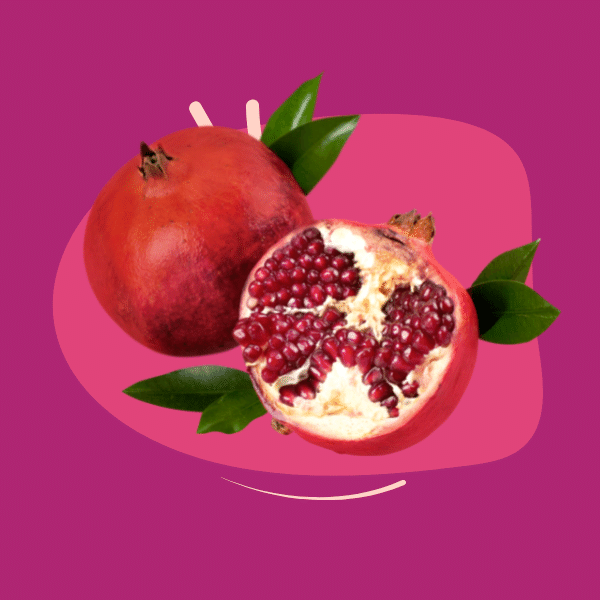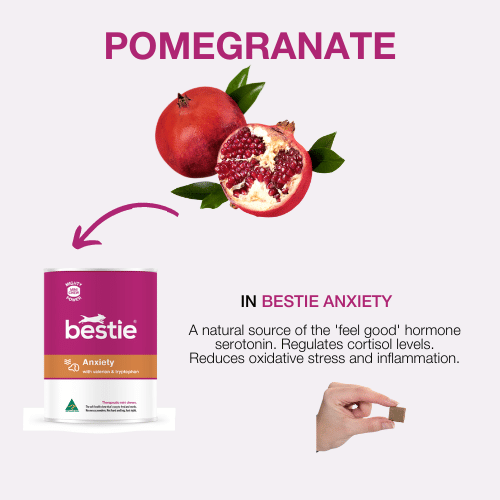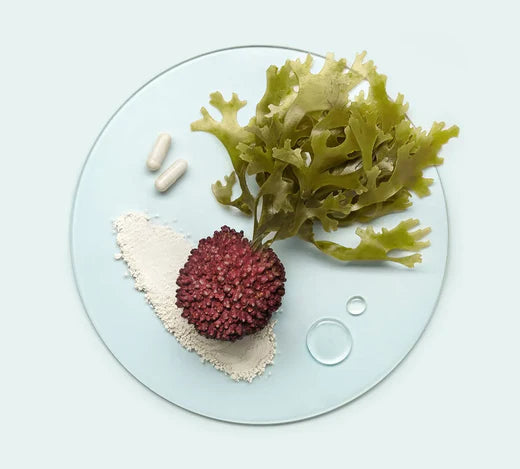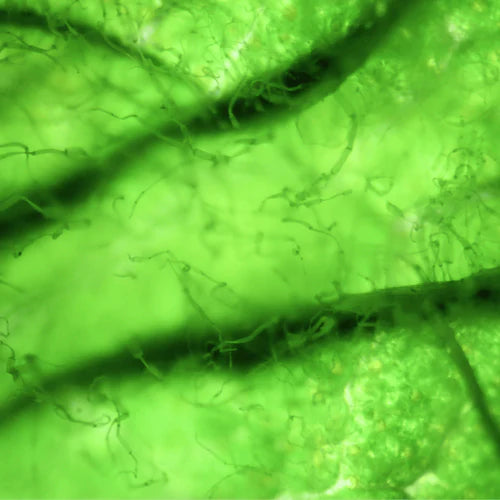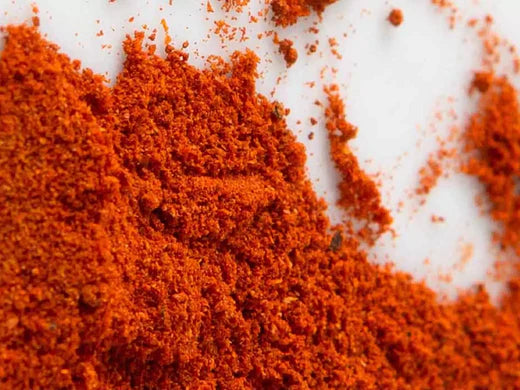Pomegranate (Punica granatum) is a superfood. This ancient fruit originated from the Mediterranean region, tropical Africa, and Southeast Asia. It’s has been described in religious books as one of the paradise fruits.
In ancient times, pomegranate was used in ayurvedic medicine as a treatment for parasites, diarrhoea, ulcers, and diabetes mellitus. It was also prescribed for inflammation and rheumatism.
Today, various scientific studies are focused on pomegranate’s nutritional value and therapeutic actions such as anti-inflammatory, anticancer, and antioxidant properties. However, it’s also high in ellagic acid. Ellagic acid is responsible for the antidepressant and anti-anxiety effects of pomegranate.
That’s also why pomegranate is one of the major ingredients of the Bestie Anxiety chew formulated to address anxious behaviour in pets. It works alongside other ingredients like b-complex powerhouse nutritional yeast, linden powder, valerian powder, tryptophan, l-theanine and hawthorn powder.
That said, pomegranate has a host of benefits. (Also one of the reasons we like to use whole foods…) Read on to find out more.
What's in pomegranate?
The bio-active constituents of pomegranate juice possess strong anti-atherosclerotic, anti-hypertensive, anti-aging, and potent antioxidant properties. The seed oil possesses good nephroprotective properties. About 70% of the pomegranate seed oil is made up of unsaturated fatty acids, like punicic acid.1
The pericarp (rind and peel) has anti-inflammatory, antifungal, and anti-mutagenic activities. The peel is approximately 50% of the total weight of the pomegranate fruit. It also contains a higher percentage of polyphenols than the edible part of the fruit. The primary constituents of the pomegranate peel are the main reasons why the peel is mainly used to obtain food additives or potential functional ingredients. 2
The total phenolic contents of pomegranate peel extract (PPE) is 10-fold higher than that of its pulp extract. Of variously prepared PPE and pomegranate seed extracts, the methanolic extract of pomegranate peel has reportedly shown the highest antioxidant activity.3
Pomegranate leaves have good antioxidant properties. And the flowers have hepatoprotective and antioxidant properties. The flowers are also used as a remedy for diabetes mellitus. The barks and roots are known for their vermifuge and anthelmintic properties.4
Table 1. Major Constituents Of Pomegranate*
|
Pomegranate Juice
|
Pomegranate Seed Oil |
Pomegranate Pericarp (Peel, Rind) |
Pomegranate Leaves |
Pomegranate Flowers |
|
Anthocyanins Sugar Ascorbic acid Ellagic acid Caffeic acid Gallic acid Quercetin Catechin Rutin Epigallocatechin Iron Amino acids
|
Punicic acid Sterols |
Punicalagins Flavones Flavonones Other flavanols Ellagic acid |
Tannins -- punicafolin, punicalin
Flavone glycosides -- pigenin, luteolin |
Ursolic acid Maslini acid Asiatic acid |
*Source: Padmaja Kalshettia, Ramesh Allurib , Prasad Thakurdesaic. Antidepressant and Anti-Anxiety Effect of Ellagic Acid from Punica granatum L. Rind in Olfactory Bulbectomy Model in Rats.Int. J. Pharm. Sci. Rev. Res., 34(1), September – October 2015; Article No. 32, Pages: 197-204
Health benefits of pomegranate
The major component of pomegranate that contributes to its health benefits is attributed to its polyphenolic fraction which is mainly composed of ellagitannins (tannins).
Antidepressant and anti-anxiety (Hello The Om)
Ellagic acid is responsible for the antidepressant and anti-anxiety effects of pomegranate. Its anxiety effects are comparable to Fluoxetine, a common anxiety medication.4
Ethanolic extract of pomegranate possess significant anticonvulsant and anxiolytic activity.5
Anticancer effect
These polyphenols in pomegranate, particularly punicalagin and ellagic acid, have also demonstrated considerable anticancer activity in various in vitro and in vivo studies. The chemopreventive property of pomegranate is partially attributed to ellagic acid and its derived metabolites, urolithins.9
Antioxidant activity
The antioxidant activity of pomegranate has been shown to reduce biomarkers related to cardiovascular risks, such as blood lipids, insulin resistance, glucose, lipid peroxidation, etc.6 Several studies have also demonstrated that pomegranate reduced oxidative stress, associated with various health issues including kidney disease, type 2 diabetes, metabolic syndrome, and hypercholesterolemia to name a few.
Effect on blood glucose
Pomegranate is effective in reducing fasting glucose levels and blood glucose increase after engaging in stress-related activities.7
Effect on blood pressure
Substantial evidence is available describing the long-term beneficial effects of pomegranate on the management of blood pressure.8
Anti-inflammatory activity
Pomegranate supplementation has been shown to reduce the clinical symptoms in patients diagnosed with rheumatoid arthritis and osteoarthritis. * A study showed pomegranate exerts a protective effect through amelioration of cartilage inflammation by attaining a better antioxidant status.10
Prebiotic Effect
The fibre and polyphenols in pomegranate play a significant role in modulating the gut microbiota. Many studies were able to demonstrate the positive interaction between pomegranate and gut microbiota and its beneficial effects on the prevention or treatment of dysbiosis-related chronic diseases.11 Pomegranate’s ability to modulate gut bacteria is helpful in maintaining the integrity of the intestinal barrier.
Neuroprotection and support of cognitive function
The neuroprotective ability of pomegranate is attributed to the biological activity of ellagic acid and urolithins. In one study, subjects with age-related memory disorders consumed pomegranate and after four months showed a significant improvement in mental ability tests which is attributed to enhanced functional brain activation.12
Pomegranate for dogs and cats
Supplementing with pomegranate has been shown in several clinical trials to have a beneficial effect on the overall health of various body systems of pets.
Cardiovascular benefits
Cardiac diseases are considered to be the second most prevalent cause of death for dogs.13Polyphenols in pomegranate have cardio-protective benefits. These antioxidants reduce oxidative stress which has been shown to induce cardiovascular damage and cause the progression of various diseases of the heart.
Promotes gut health
Pomegranate has a positive impact on hindgut fermentation. It has also been shown to improve the growth of probiotic organisms in the hindgut. Microbes in a dog’s hindgut have the ability to convert polyphenols in plants to simple bioactive compounds that can have a positive impact on gut health.
Supplementation of pomegranate can alter the metabolism of gut bacteria resulting in an increase in the synthesis of short-chain fatty acids (SCFAs). These fatty acids provide additional sources of energy as well as regulate the balance with how energy is used in the body.14
SCFAs can also help in the reduction of diet-induced obesity, and treatment of metabolic syndrome characterized by loss of glycemic control and obesity.
Antibacterial activity
The proliferation of probiotic organisms can negatively affect the population of bad bacteria in the hindgut. This is beneficial not only to gut health but also to the overall health of your pet.
Promote dental health
Pomegranate extract added to pet food, treats, or water additives has been demonstrated to promote oral hygiene in dogs.15Its antibacterial and anti-inflammatory properties can reduce halitosis (bad breath) and gum inflammation in pets by limiting the proliferation of bacteria.
Pomegranate is regarded as safe for dogs and cats
Pomegranate and its constituents have safely been consumed for centuries without any side effects. Studies of pomegranate constituents in animals showed no toxic effects, at concentrations commonly used in folk and traditional medicine.16
However, there may be individual differences in how cats and dogs react to pomegranate; it may work well with some, while it doesn’t with others. Be sure to keep a close eye on your pet for any side effects, and if there are any, you should bring it to your veterinarian’s attention.
List of References:
- Sreekumar, H. Sithul, P. Muraleedharan, J.M. Azeez, S. Sreeharshan Pomegranate fruit as a rich source of biologically active compoundsBioMed Research International (2014), p. 686921, 10.1155/2014/686921
- Juan Antonio Gim´enez-Bastida, María Angeles, Avila-G´alvez, Juan Carlos Espín, Antonio Gonzalez-Sarrías. Evidence for health properties of pomegranate juices and extracts beyond nutrition: A critical systematic review of human studies. Trends in Food Science & Technology. Volume 114, August 2021, Pages 410-423. https://doi.org/10.1016/j.tifs.2021.06.014
- Singh RP, Chidambara Murthy KN & Jayaprakasha GK (2002) Studies on the antioxidant activity of pomegranate (Punica granatum) peel and seed extracts using in vitro models. J Agric Food Chem 50, 81–86. DOI: 1021/jf010865b
- Padmaja Kalshettia, Ramesh Allurib , Prasad Thakurdesaic. Antidepressant and Anti-Anxiety Effect of Ellagic Acid from Punica granatum L. Rind in Olfactory Bulbectomy Model in Rats.Int. J. Pharm. Sci. Rev. Res., 34(1), September – October 2015; Article No. 32, Pages: 197-204
- Das, S. & Singh, Anirban. (2014). A study on the anticonvulsant and antianxiety activity of ethanolic extract of Punica granatum Linn. International Journal of Pharmacy and Pharmaceutical Sciences. 6. 389-392.
- Gouda, M., Moustafa, A., Hussein, L., & Hamza, M. (2016). Three week dietary intervention using apricots, pomegranate juice or/and fermented sour sobya and impact on biomarkers of antioxidative activity, oxidative stress and erythrocytic glutathione transferase activity among adults. Nutrition Journal, 15(1), 52. https://doi.org/10.1186/s12937-016-0173-x, 52.
- Ammar, A., Turki, M., Chtourou, H., Hammouda, O., Trabelsi, K., Kallel, C., Abdelkarim, O., Hoekelmann, A., Bouaziz, M., Ayadi, F., Driss, T., & Souissi, N. (2016). Pomegranate supplementation accelerates recovery of muscle damage and soreness and inflammatory markers after a weightlifting training session. PloS One, 11(10), Article e0160305. https://doi.org/10.1371/journal.pone.0160305
- Balbir-Gurman, A., Fuhrman, B., Braun-Moscovici, Y., Markovits, D., & Aviram, M. (2011). Consumption of pomegranate decreases serum oxidative stress and reduces disease activity in patients with active rheumatoid arthritis: A pilot study. The Israel Medical Association Journal: The Israel Medical Association Journal, 13(8), 474–479.
- Tomas-Barberan, F. A., Selma, M. V., & Espín, J. C. (2018). Polyphenols’ gut microbiota metabolites: Bioactives or biomarkers? Journal of Agricultural and Food Chemistry, 66, 3593–3594. https://doi.org/10.1021/acs.jafc.8b00827
- Ghoochani, N., Karandish, M., Mowla, K., Haghighizadeh, M. H., & Jalali, M. T. (2016). The effect of pomegranate juice on clinical signs, matrix metalloproteinases and antioxidant status in patients with knee osteoarthritis. Journal of the Science of Food and Agriculture, 96(13), 4377–4381. https://doi.org/10.1002/jsfa.7647
- Cort´es-Martín, A., Selma, M. V., Tom´as-Barber´an, F. A., Gonz´alez-Sarrías, A., & Espín, J. C. (2020b). Where to look into the puzzle of polyphenols and health? The postbiotics and gut microbiota associated with human metabotypes. Molecular Nutrition & Food Research, 64(9), 1900952. https://doi.org/10.1002/mnfr.201900952
- Bookheimer, S. Y., Renner, B. A., Ekstrom, A., Li, Z., Henning, S. M., Brown, J. A., Jones, M., Moody, T., & Small, G. W. (2013). Pomegranate juice augments memory and fMRI activity in middle-aged and older adults with mild memory complaints. Evidence-based Complementary and Alternative Medicine, 946298. https://doi.org/10.1155/2013/946298
- Eichelberg, H. & Seine, R. Life expectancy and cause of death in dogs. I. The situation in mixed breeds and various dog breeds. Berl Munch Tierarztl Wochenschr 109, 292-303 (1996).
- Tony Jose, Ashok K. Pattanaik, Sunil E. Jadhav, Narayan Dutta, and Shalini Sharma. Nutrient digestibility, hindgut metabolites and antioxidant status of dogs supplemented with pomegranate peel extract. J Nutr Sci. 2017; 6: e36. doi: 1017/jns.2017.34
- K.R. Santos, L.M.S. Baptista, L. Hauptli, A.L.F. Lima, D.P. Netto, F. Dahlke, P.O. Moraes, Development of baked biscuits containing propolis and pomegranate for oral health in dogs, Animal Feed Science and Technology, Volume 280, 2021, 115056, ISSN 0377-8401, https://doi.org/10.1016/j.anifeedsci.2021.115056.
- Holland, D.; Hatib, K.; Bar-Yaakov, I. Pomegranate: Botany, horticulture, breeding. In Horticultural Review; Janick, J., Ed.; John Wiley & Sons: Hoboken, NJ, USA, 2009; pp. 127–191.


